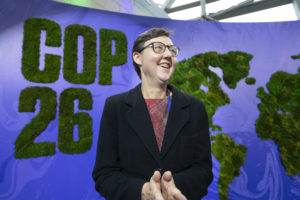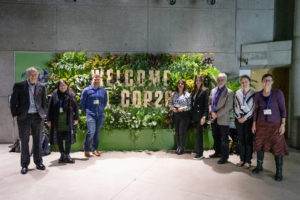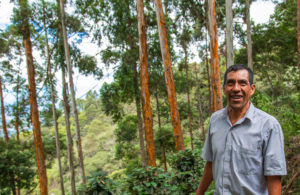Climate change is having a profound impact on the communities Practical Action works with. The way in which the world responds to the climate emergency is crucial to all our futures and we know that those living on the front line are now facing an emergency of unprecedented proportions. It was with this in mind that I joined colleagues from every continent we work in at COP26 in Glasgow.

Sarah Roberts at COP26
We were there to amplify the voices of the people we work with, and to share what we have learned from those who are already adapting to extreme climate events. Some of our staff were part of national delegations, directly influencing the negotiations. Others made sure that a range of people with influence on the COP outcomes were hearing what is required by the most vulnerable and focused on ensuring more support and finance is directed to meeting those needs.
Through the two weeks we provided evidence and technical support to governmental delegations, participated at events and spoke to the media. We showcased bottom-up adaptive work by people on the front line of climate change, which works with nature, not against it. We called for a new focus on the approaches and resources needed to scale change and enable communities to adapt and deal with the loss and damage that they are already experiencing.
We went into the talks with five calls to action:
1) Limit warming to 1.5 degrees
2) Address loss and damage caused by climate change
3) Scale up finance for adaptation to climate change
4) Ensure progress is inclusive across gender, age, income and ethnicity
5) Promote climate adaptive solutions that work with nature
Disappointing outcomes
In the run up to the COP the latest science declared a code red for humanity but the outcomes of COP fell way below what is required to move us onto a path that limits global warming to 1.5 degrees, critical for a viable future. Even if 100 per cent of the commitments made at Glasgow are met, we are still on a trajectory for at least 2.4 degree warming, which would be catastrophic.
A key goal on climate finance of $100bn per year to support developing countries transition to a cleaner future, was missed, representing a collective failure to deliver essential financial support to countries who have done the least to cause the climate emergency.
Perhaps the biggest disappointment was the limited progress on addressing loss and damage people are facing from climate impacts which are only going to increase. The largest negotiating group, the G77, which represents 6 billion people, including the most climate impacted people around the world, proposed the Glasgow Loss and Damage finance facility. This attracted financial commitments from some regional governments and philanthropic organisations, but the final agreed decision was weak and focused on dialogue and process, not implementation. Making the Loss and Damage Finance Facility a reality and ensuring that money reaches communities fairly and effectively will be a key focus for us in the future.

Practical Action team at COP26
But
This is a better path than we have had before. An important outcome of COP is that countries now need to improve their plans to reduce emissions, adapt and deal with loss and damage annually, rather than every five years. This accelerated timeframe is essential, since the slow pace in the negotiations and action means we are now in a situation where we must halve emissions by 2030 to keep warming in line with the 1.5 degree limit.
While there was huge disappointment at the way that the text on phasing out fossil fuels was watered down at the eleventh hour, it was the first time that ‘fossil fuels’ had featured in a COP decision. It is now essential we build on this and increase the pressure to accelerate this phase out. Partnerships such as the Just Energy Partnership provide a positive model for how this could be done. In this case, the US and EU countries are providing $8.5bn in grants and cheap loans over the next five years to enable South Africa, the 12th largest emitter of carbon, to transition out of coal and be in a line with a 1.5 degree pathway. With 120,000 coal-related jobs in a country with one of the highest unemployment rates in the world, support for a just transition is crucial. If done well, there should be a range of social and economic, as well as environmental benefits, as the current coal-based system is hugely costly, unreliable and a cause of significant health problems from pollution.
Signs of hope
This is one of the signs of hope, coming through from a whole range of commitments by various partnerships and coalitions, which were announced alongside the negotiations on the political framework and text. If these commitments are fully implemented and scaled, they could make a significant difference to the delivery of a just transition and bend the pathway further towards the 1.5 degree limit.
Below we have highlighted a few that are particularly relevant to our work.
We have been involved in scaling energy access for decades so we were particularly encouraged by the launch of the Global Energy Alliance for People and Planet. This is hugely ambitious, aiming to reach one billion underserved people with reliable, renewable power avoiding four billion tons of carbon emissions and creating 150 million jobs. Clearly, this is a partnership we want to see succeed. It is an interesting model, aiming to use $10bn of philanthropic funding to lever a further £100bn from multilateral development banks and additional private funders. At Practical Action we are particularly interested in the strong emphasis on energy for agriculture and the potential for further crossover into regenerative agriculture.
Regenerative agriculture that delivers for smallholder farmers is a key part of the transition to a sustainable food system and we have been building programmes in Africa, improving livelihoods and building the business case for regenerative approaches. Just before COP we held a series of regenerative agriculture hubs to support companies interested in scaling regenerative approaches through their supply chains, so we were delighted by the launch of Regen 10, a plan by the World Business Council for Sustainable Development and 12 partners to scale worldwide regenerative food production systems in a decade. It has ambitious targets of reaching 500 million farmers and mobilising $60bn a year to finance the transition.
There was welcome focus on the need for a ‘Just Rural Transition’ and food systems that deliver food security and work for smallholders and nature. Various partnerships announced their aims to amplify innovative and ambitious policies, investments, and multi-stakeholder solutions that deliver positive outcomes for people, planet, and economies, all of which resonate strongly with Practical Action’s objectives. But many of the solutions being offered are top-down, with a focus on increased access to inputs, technology and training. We need to ensure that there is much more support at the local and community level, supporting existing local and indigenous knowledge with scientific techniques and supporting and enhancing local innovation.
One of the first major announcements at COP was that countries representing 85% of the worlds forests committed to ending deforestation by 2030. The pledge is supported by 14 billion of public and private investment over the next five years. Well below what is required but something to build on. The pledge will support climate mitigation and adaptation, address the systemic drivers of forest loss and enable the conservation, sustainable management and restoration of forests in eligible countries. This is the type of work that we have been doing with coffee farmers in the cloud forests of the Amazon and Nepal so we really hope that the implementation reality will match the commitment rhetoric.

Melanio, a farmer in Peru working on reforestation
What next?
Outcomes from COP 26 were nowhere near good enough but it feels like we have reaching a positive tipping point, in terms of public support and increased momentum for the type of systemic change that is essential.
Glasgow laid bare the red lines between the various different positions. The UK retains the COP presidency until COP27 and we will be working with various coalitions to push the UK leadership team to really use their influence and mandate to overcome some of these divisions and enable COP27 to deliver much more.
Practical Action’s decades of experience in helping people on the front line of climate change adapt sustainably to the new challenges they face has never been more relevant, nor more necessary. We will continue to work with many others to support, demonstrate and scale the solutions required for positive futures for the people on the front line of climate change and get finance redirected to climate solutions that deliver for people and nature.